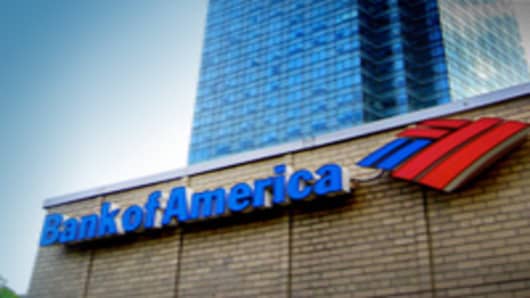They've got Dick Bove and Meredith Whitney on their side.
The underlying idea is that an equity raise would dilute existing shareholders, pushing the price down even further.
But despite all the intellectual firepower on the "no new equity" side of the argument, I think this idea is probably wrong. Bank of America's stock would rise if it raised new capital.
In fact, I think Bank of America’s stock is rallying today on rumors of a new capital raise.
Today’s surge is very possibly built off the prediction by JPMorgan analyst Kabir Caprihan that Bank of America will be forced to raise capital.
"The equity and credit markets are becoming increasingly clear in their message that the company needs to address the capital and mortgage issues; we think it is getting more difficult for management to ignore this sentiment," Caprihan wrote in a note that upgraded the bank from “underperform” to “neutral.”
Why is the dilution theory so wrong? Why rally on predictions of a shareholder dilutive equity round?
Well, in the first place, it's simply not true that dilution destroys shareholder value. If an equity offering results in a healthier company, the shareholders can gain value. They'll own a smaller stake in a better company. That can be bullish.
This is not just a theoretical possibility. We saw it happen with Lehman Brothers in 2008, when even rumors of investors buying new equity stakes would send the shares of Lehman shooting upward. Where was the fear of dilution? It was subsumed by the relief rally.
This isn't just the case of anecdotal evidence. Recent studies have shown that the conventional wisdom on equity capitalization for banks is backwards. In a paper for the Review of Financial Studies called “Bank Capital and Value in the Cross-Section,” scholars Hamid Mehran and Anjan Thako looked at how equity capital effects the value of banks in merger contexts. What they found is that banks with more equity command higher prices. Yes, that's right: More equity capital raises the value of the bank and creates more value for shareholders.
Bank of America increasingly looked like it is priced for death, hitting lows not seen since the fearful days of 2009. A successful sale of an equity stake, especially to a highly credible investor, would bolster confidence in the bank. It would dilute shares but push the price up.
So here's my call: If Bank of America does abandon its "no new equity" stance, shares will rally.
__________________________________________
Questions? Comments? Email us atNetNet@cnbc.com
Follow John on Twitter @ twitter.com/Carney
Follow NetNet on Twitter @ twitter.com/CNBCnetnet
Facebook us @ www.facebook.com/NetNetCNBC



